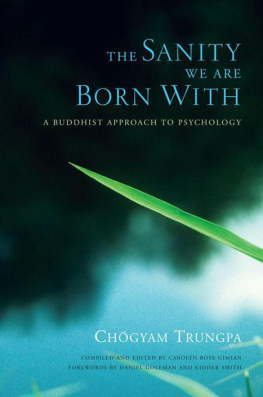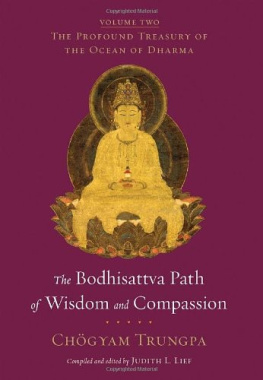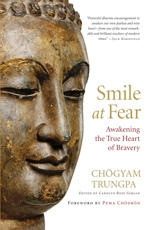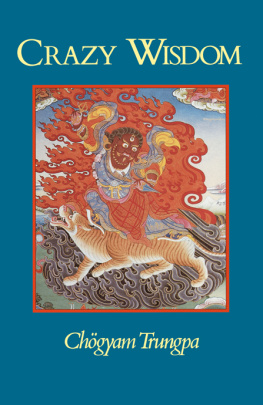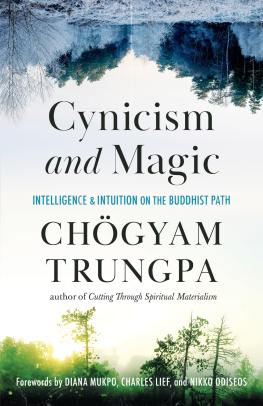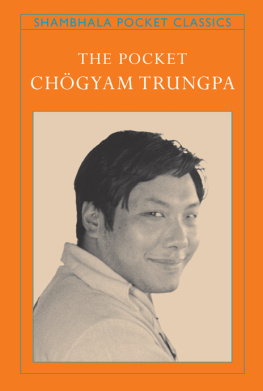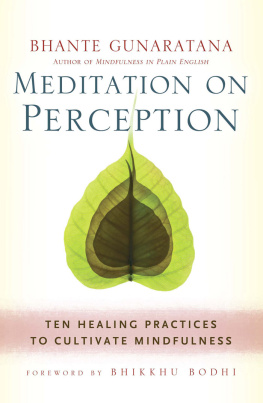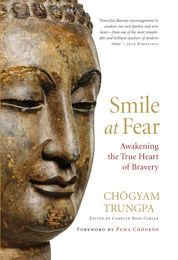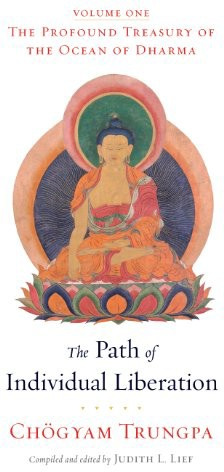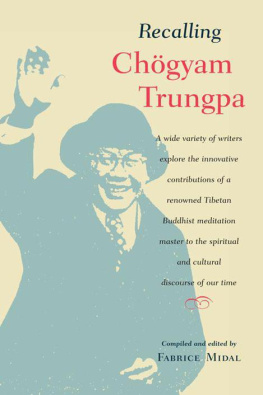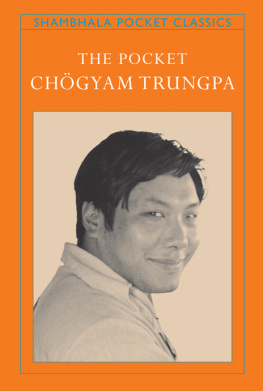THE
Sanity We Are Born With
A BUDDHIST APPROACH TO PSYCHOLOGY

Chgyam Trungpa
Compiled and edited by Carolyn Rose Gimian
Forewords by Daniel Goleman and Kidder Smith

SHAMBHALA
Boston & London
2010
Shambhala Publications, Inc.
Horticultural Hall
300 Massachusetts Avenue
Boston, Massachusetts 02115
www.shambhala.com
2005 by Diana J. Mukpo
Editors Introduction 2005 by Carolyn Rose Gimian
Foreword by Daniel Goleman 2005 by Daniel Goleman
Foreword by Kidder Smith 2005 by Kidder Smith
For further copyright information, see the Sources section.
All rights reserved. No part of this book may be reproduced in any form or by any means, electronic or mechanical, including photocopying, recording, or by any information storage and retrieval system, without permission in writing from the publisher.
Library of Congress Cataloging-in-Publication Data
Trungpa, Chgyam, 1939
The sanity we are born with: a Buddhist approach to psychology / Chgyam Trungpa;
compiled and edited by Carolyn Rose Gimian.
p. cm.
eISBN 978-0-8348-2127-9
ISBN 978-1-59030-090-9
1. BuddhismPsychology. I. Gimian, Carolyn Rose. II. Title.
BQ4570.P76T78 2005
294.3019dc22
2004056509
CONTENTS
FOREWORD
Daniel Goleman
T HE YEAR WAS 1975, the setting a restaurant in Cambridge, Massachusetts. Chgyam Trungpa Rinpoche had invited me out to dinner to tell me about his plans for a new educational institution he was founding, Naropa Institute. At one point in the conversation he leaned across the table toward me with a conspiratorial air, looked me straight in the eye, and said emphatically, Buddhism will come to the West as a psychology.
That proposition made immediate sense to me. I had recently received my doctorate in psychology from Harvard, and returned there as a visiting lecturer after a year of postdoctoral study in Sri Lanka and India. My topic was abhidharma, an ancient Buddhist theory of mind that has been in continual use as an applied psychology for the last fifteen hundred years or more.
Of course, I had never heard of this system in any of my academic psychology studies. The implicit assumption (culture-bound and flavored with hubris though it may be) was that the field of psychology had begun only a century before, in Europe and Americanone of my psychology professors had ever heard of abhidharma. I took Rinpoches observation to mean that Western students of psychology would soon be hearing whispers of abhidharma that might inspire them to pursue further study of Buddhism. Indeed, he sprinkled his teachings with nuggets from this rich psychological mine, offering practical hints on everything from ones state of mind while diapering the baby to transforming aggression. Trungpa Rinpoche was among the very first to offer such glimpses to a Western audience, sometimes casually interspersing these into a discussion and sometimes discoursing on them at great length.
This volume does a great favor for Western readers who want to understand the view Buddhist psychology takes of the human condition, pulling together a lifetime of insights on the subject by one of its most articulate teachers. Buddhism, like Western thought, harbors multiple schools of philosophy and psychology of mind. Several of these are represented here, though there are still more awaiting exploration by those readers who find themselves intrigued. Chgyam Trungpa offers us a rich banquet, with many inviting, intriguing, and delicious glimpses into these Buddhist perspectives on our mind and life.
FOREWORD
Kidder Smith
P ERHAPS IT S A SHOCKING THOUGHT , that we are all born sane. But the Buddhist tradition goes further still, declaring that we are actually sane right now. Whatever confusions we experience, whatever doubts or anxieties may arise, at the base of all this, in the midst of all this, our fundamental sanity is always present. We might say that this book seeks to demonstrate how such an outrageous claim can be true. But actually this book provides a means for you, the reader, to determine its truth for yourself.
That means is meditation. As Trungpa Rinpoche says, meditation is a way of clarifying the actual nature of mind. Insofar as psychology is the study of mind, meditation offers us a psychological practice that is uniquely intimate. It is not someone elses experience we are studying, it is our own. And yet, as we will see, meditation takes us into the same intimacy with other beings that we have with ourselves.
What is mind? Everything. We get a hint of that in the way our experience is continuous. Even in deepest sleep our mind is active, aware, processing. When we meditate, attending consciously to mind, it never abandons us, never runs out or expires. Not only is our consciousness abundantly wall-to-wall, it actually is those walls, and everything imaginable or unimaginable lying beyond them. There is no end to this, nor exit from it. When we plan our escape, it is already taking place in mind. When we reach our destination, we are here in mind as well.
All we know is mind. It creates our world. By meditating, we are dealing with the very mind that devised our eyeglasses and put the lenses in the rims, and the very mind that put up this tent. Our coming here is the product of our minds.... So this is a living world, minds world. Realizing this, working with mind is no longer a remote or mysterious thing to do. It is no longer dealing with something that is hidden or somewhere else. Mind is right here. Mind is hanging out in the world. It is an open secret.
Unhidden, omnipresent, not elsewhere, endless, thats quite a lot. So when we seek to work with mind, we need a discipline that is equally vastand utterly simple. Otherwise its like trying to devise an elaborate set of china platters, pewter flagons, and silver utensils for serving up the whole world. There would never be enough of them the right shape, nor could the world ever fit comfortably inside. Actually, all we need is one very, very big flat plate. Meditation is that open plate; it accommodates everything. Thus in chapter after chapter, Trungpa Rinpoche returns us to simplicity. All we need to do is just sit here on the earth. We breathe. We give bare attention to that breath.
As we settle into doing nothing much, we start bumping into our thought processes. At first we may notice only their valences of like, dislike, or neutrality. But as we become more familiar with this way of attending, we begin to sense the subtler and more complex dynamics of mind. Several chapters in Part Two of this book address these matters: the eight consciousnesses, the six realms, the five buddha families, and so on. Here the practice of psychology means recognizing these patterns as they begin to show themselves, like seascapes at the bottom of an ocean when the winds subside.
Even before we start noticing that clarity, Trungpa Rinpoche urges us further into the ungainly: Dont be afraid of being a fool; start as a fool. The techniques of meditation practice are not designed to reduce active thoughts at all. They provide a way of coming to terms with everything that goes on inside.... When we begin to find the spiky quality in ourselves, we see it as antispirituality and try to push it away. This is the biggest mistake of all in working with our basic psychological patterns. Here the psychotherapist meets her first client: herself. In the practice of sitting meditation, she has no compulsion to reduce, alter, or reject anything or anyone. All are welcome. All are simply thoughts. They manifest in varying intensity or appeal, and endless flavors, but their nature is always the same. They are only that, that, that.
Next page
